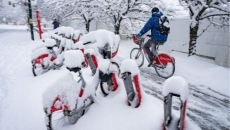Federal immigration officials warned the government it risked undermining the temporary immigration system with the design of the emergency visa program for war-displaced Ukrainians, newly released court documents show.
Immigration Department staff raised the concern in a memo to Sean Fraser, immigration minister at the time, shortly after the program was announced.
The memos outline the design of the Ukraine visa program, which allowed an unlimited number of Ukrainians and their family members to come to Canada to wait out the war.
The policy also waived the requirement for fleeing Ukrainians to promise to leave when their visa expires, against the advice of department staff.
"Waiving the need for a client to establish temporary intent would set a significant precedent that is not recommended, given that it would undermine a foundational component of the (temporary resident) legal framework," staff said in the memo to Fraser, which was signed March 14, 2022.
Staff cautioned that waiving the requirement — the foundation of the temporary resident program — would set an "expectation that it could be done for other populations, not only those affected by conflict."
The documents were disclosed as part of a proposed lawsuit against the federal government by three Afghan Canadians, who allege Canada discriminated against Afghan refugees by treating them differently than it did Ukrainians fleeing the Russian invasion.
The lawsuit hasn't yet been certified by the court.
"The government knew that what they were doing was unfair," said Nicholas Pope, one of the lawyers representing the Afghan Canadians.
"That's just what we're arguing in this case. That it's unfair, it's discriminatory, and there's not a good reason why protections shouldn't be applied to people who aren't from Europe."
The lawsuit was filed by Canadians who served as language and culture advisers to the Canadian government and NATO during the war in Afghanistan, but haven't been allowed to bring family members in Afghanistan to safety.
Canada has approved some 962,600 emergency visas for Ukrainians since the 2022 Russian invasion, which allow people fleeing the conflict to work and study while the war rages.
The program was generally well received in Canada, where people opened their homes to Ukrainians and donated clothes, furniture and other essentials to help them settle during their stay.
Roughly 298,000 actually made the trip to Canada, though it's unclear how many have stayed, and how many have since applied for permanent residency.
The documents also warn the design of the program could disadvantage Ukrainians by effectively creating "second class" permanent residents, without access to settlement supports or equivalent status under the law.
The government has argued the emergency program for Ukrainians can't be compared to the program for Afghan refugees, because people from Afghanistan are unlikely to be able to return home.
In the memo, though, staff say the key distinction between temporary programs and permanent ones is the requirement that visa holders declare their intention to leave.
The department officials described the Ukraine emergency visa program as "exceptional in nature."
"It underscores Canada's unique relationship with Ukraine, the extensive diaspora and family links, as well as the unique nature of the conflict as a significant land invasion adjacent to EU countries with generous immigration measures," the memo reads.
"However, it risks setting a significant precedent, one which may result in future pressures on the government to take similar action for other emergencies."
Two full pages of legal considerations outlined by the department were blacked out in the documents provided to the court.
Fraser ultimately agreed with the department's recommendation not to publish the policy publicly, given the "unprecedented and exceptional nature" of the approach.
Pope seized on that point Tuesday.
"Why would you not publish a policy if you're proud of it, and you think that it's fair, and you think that it's just and you think that it's Charter compliant?" he asked.
"I think they really understood the problematic nature of this."
The offices of Fraser, now housing minister, and the current immigration minister, Marc Miller, did not immediately respond to requests for comment.
The government has emphasized that the Ukrainian program is intended to be temporary, and has encouraged those without family ties to Canada to apply for permanent residency through traditional means if they hope to stay.
Since Fraser announced the visa program, the government has faced accusations of unfairly limiting temporary refuge to people attempting to flee conflicts in Sudan and the war between Israel and Hamas in the Gaza Strip.
In February the Canadian Council for Refugees pointed out the disparity between the program for Ukrainians and the temporary refuge programs for Sudanese people.
"The crisis in Sudan … is of catastrophic proportions," the group wrote to Miller earlier this year.
"Given the scale of the crisis, the limit of 3,250 applications in the family-based humanitarian pathway is inadequate to the need. In contrast, Canada admitted an unlimited number of Ukrainians on temporary visas, and the pathway to permanent residence for Ukrainians is similarly without a cap."






